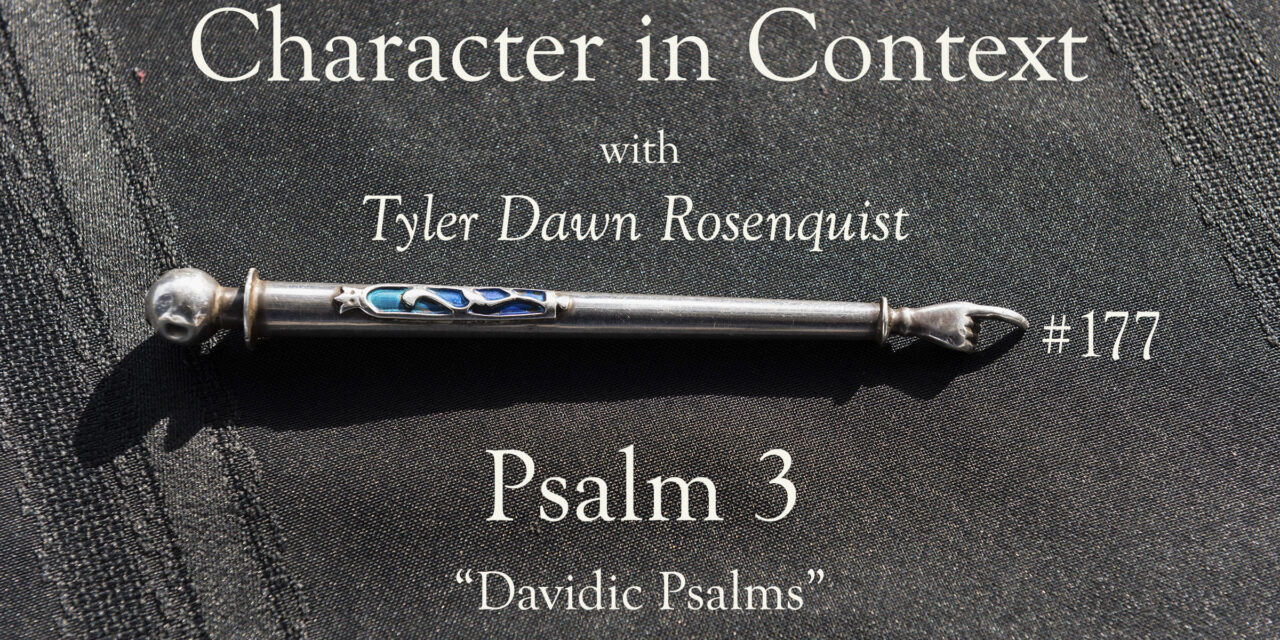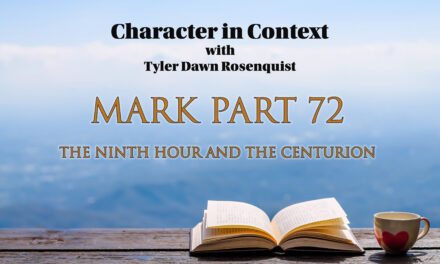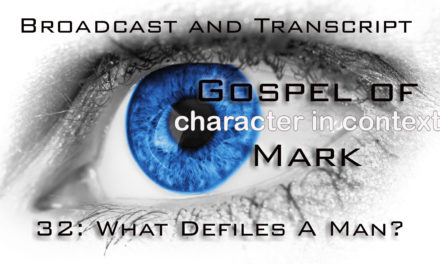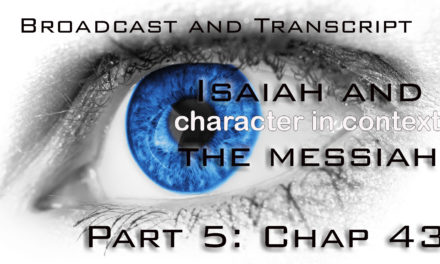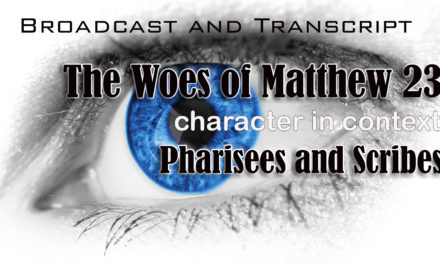What is a Psalm of David? Or is it a Psalm by David? A Psalm in the style of David or about him? This week, we will talk about irritating Hebrew conjunctions and why context is incredibly important—and sometimes unknowable. And what about the fourteen titled Psalms? How do we read this one in light of David and Absalom? The Bible is a messy book about messy people and messy situations–so this Psalm is going to be really messy too.
(My affiliate links for Amazon products are included in the post. As an Amazon Associate, I earn from qualifying purchases.)
If you would like to see a slightly longer video version, click here. If you can’t see the podcast player in your email, click here.
Alright, we have finished up the introductory Psalms, one and two, and now we are entering into those formally ascribed to David in some way—but Hebrew conjunctions can be super tricky, and we aren’t always sure what these titles actually meant to say. In addition, it seems very clear that these titles were added later (or were they?) by whoever it was that collected these songs, laments, hymns, etc., into the five books that make up what we now call the Psalms but in Hebrew are called Tehillim. I am going to tell you right now that I love the laments, and evidently, so did the compilers because they make up 40% of the Psalms—way more than the praise hymns. The laments do more to teach us about how we should and even can relate to God than anything else in the Bible—except for the words of Yeshua/Jesus. The laments are brutally honest, accusatory, and filled with curses against enemies—but how should we even deal with the violent sentiments of these works? And what the heck does selah mean? Lots and lots to talk about this week!
Hi, I am Tyler Dawn Rosenquist, and welcome to Character in Context, where I teach the historical and ancient sociological context of Scripture with an eye to developing the character of the Messiah. If you prefer written material, I have years’ worth of blogs at theancientbridge.com as well as my six books available on Amazon—including a four-volume curriculum series dedicated to teaching Scriptural context in a way that even kids can understand it, called Context for Kids (affiliate link). I also have two video channels on YouTube with free Bible teachings for adults and kids. You can find the links for those on my website. Past broadcasts of this program can be found at characterincontext.podbean.com, and transcripts for most broadcasts at theancientbridge.com. If you have kids, I also have a weekly broadcast where I teach them Bible context in a way that shows them why they can trust God and how He wants to have a relationship with them through the Messiah.
As we did last week, the Psalm itself will be read initially from Robert Alter’s excellent The Book of Psalms: A Translation with Commentary (affiliate link). After that, I will pull all Scripture from the Christian Standard Bible (CSB). Remember that Alter loves to capture more of the sound and the brevity of the Psalms in Hebrew, which is always like a third of the words we use in English to try to say the same thing.
A David psalm, when he fled from Absalom his son. LORD, how many are my foes, many, who rise up against me. Many, who say of my life: “No rescue for him through God.” selah And You, LORD, a shield are for me, my glory, Who lifts up my head. With my voice I cry out to the LORD, and He answers me from His holy mountain. selah I lie down and I sleep. I awake, for the LORD has sustained me. I fear not from myriads of troops that round about set against me. Rise, LORD! Rescue me, my God, for You strike all my foes on the cheek, the teeth of the wicked You smash. Rescue is the LORD’s! On Your people Your blessing. Selah
What can we call this psalm? As far as categories go, it is first and foremost a lament, which is the type of psalm where the author is crying out to God in complaint and often begging to be rescued. Sometimes laments accuse God of covenant unfaithfulness and wrongdoing, like in Psalm 89. Then there are the painful ones where the author is calling down some pretty nasty curses on their enemies, like the notorious Psalm 137. Others are full of confidence that Yahweh will come through with rescue and vindication, while some end on a very bitter and sour note. And then, there are laments that end with praise. The only real rule is that there is a crisis involved in a lament. Although there are some fairly reproducible patterns in how a lament is written, there are few hard and fast rules. As in real life, when we are upset, we generally just go with the flow.
In the first line of Alter’s translation, we come up against two of the great scholarly debates of our time: (1) what does the phrase mizmor l’David mean? and (2) Are these titles before the Psalms legit, or were they added later by the scribes who put the different Psalms together into the five books we have now? You need to know that there is nothing cut and dried about this. Really intelligent, well-studied, God-loving men and women have some very different ideas about this. I know because I have been reading a lot of what they had to say about it. In truth, when we don’t have people to ask (because they are dead), there are going to be things we just don’t always know for sure. Let’s take up the first question and try to figure out what mizmor l’David means when it shows up at the beginning of a Psalm. Alter translates it as “A David Psalm” but others point out that the lamed before David is a conjunction that can mean a whole lot of different things like of, by, concerning, for, in the style of, to, about, etc. I like what Alter says here because, unlike Psalm 2 being credited to David in the book of Acts, we don’t have any assurances of what exactly it means. Did David write Psalm 3 or was it written about him or to him after the victory, or in the same style as David about a situation in his life? That expression can mean a whole lot of different things, and all are legitimate options. Hebrew is really lean on their conjunctions whereas we have a ton, and they have much narrower meanings. Usually, but English is a danged mess too. The takeaway is that we have this phrase that might mean different things in different Psalms. Is it a problem if David didn’t write all of the mimzor l’David? Not really.
The second question concerns the titles like this one that claims that this was about David when he was fleeing from his son Absalom. I really fell squarely on the side of saying that I thought the title was added later by the scribes as a mode of interpretation and understanding—a sort of “when you read this, think of this historical event because this is how we are interpreting it now.” Not too different from the added in chapters, verses and subject headings we find in the Bible now. I think it is the Tree of Life Bible that has the heading “Joab the Terminator” which is way cooler and more accurate than some of the headings we find in the Gospels like “The Parable of the Prodigal Son” which limits how most people will think about and interpret said parable. And so, there are some who believe that the “titles” were added later when all the Psalms were assembled in book form to help the reader/singer out (but on the other hand, there are only fourteen of them in the whole Psalter, which argues against later naming because why only fourteen out of 150?). Certainly, nothing nefarious going on; however, if they were added later then they can really stunt how we evaluate them, but they would provide a valuable window into how they were being read at the time they were all arranged into the Psalter. Can we prove anything either way? Nope. It’s just brain candy, I suppose, but interesting brain candy. No one’s salvation hinges on this. There won’t be a test.
One thing I really love about Alter’s translation is that he makes sure to use the word “many” over and over again instead of using euphemisms because the Hebrew text wants us to see the repetition. Let’s look at the CSB and compare the two:
A psalm of David when he fled from his son Absalom.
1 Lord, how my foes increase**! There are many** who attack me.
2 Many** say about me, “There is no help for him in God.” Selah
3 But you, Lord, are a shield around me, my glory, and the one who lifts up my head.
4 I cry aloud to the Lord, and he answers me from his holy mountain. Selah
5 I lie down and sleep; I wake again because the Lord sustains me.
6 I will not be afraid of thousands** of people who have taken their stand against me on every side.
7 Rise up, Lord! Save me, my God! You strike all my enemies on the cheek; you break the teeth of the wicked.
8 Salvation belongs to the Lord; may your blessing be on your people. Selah
So, four of the words in this psalm, in the Hebrew, are related words. If you remember when we studied Isaiah 40-56 and the Gospel of Mark, that the words rabbim and polys were very important. The reason why is because the Servant in Isaiah comes to deliver the many, and in Mark, Yeshua is followed by many. Mark purposefully wrote his Gospel to paint Yeshua/Jesus as the Yahweh-Warrior/Arm of the Lord prophesied by Isaiah. Rabbim and polys, translated as many, are meant to communicate the enormity of the crowds, the delivered from exile, and here in Psalm 3, the enemies of the psalmist—who we are going to presume is David. When he says “my foes increase,” “many attack me,” “many say of me,” and “I will not be afraid of thousands,” all of those words are either rabbim or related to rabbim. Hearing them over and over again in such a short psalm, being only eight verses long, makes for a feeling of being overwhelmed and surrounded–and that’s on purpose.
Like a lot of laments, the first word is “Yahweh!” followed by a complaint. When I say complaint, I don’t want you to think of the whining the children of Israel were doing out in the wilderness—that was just totally annoying and insulting. David is in covenant with Yahweh; when his kingship is threatened, Yahweh has to act to protect David. Only Yahweh can displace His chosen king, even though David’s trouble with Absalom is 120% David’s own fault. David raped Bathsheba and had her husband murdered by proxy, and then his son Amnon followed in David’s footsteps and raped his virgin half-sister Tamar. David did nothing about it, and so Absalom, Tamar’s full brother, murdered Amnon and then lived in exile for a while until called back by David, who refused to see Absalom. Absalom’s bitterness grew until he began furtively making a play for the throne behind David’s back. He incited a rebellion that sent David running with almost all of his household except for some of his wives—whom Absalom then raped on the roof of the palace in front of the entire city of Jerusalem.
And Yahweh told David that there would be dire consequences for his crimes against Bathsheba and Uriah–that the sword would never leave his house. In fact, there was still fallout during the early reign of Solomon—although Bathsheba was finally honored as Queen mother, with a throne by her son. As we will see later in the Psalms, kings were held to higher standards than anyone else because they were appointed by God to rule and represent Him before the people and do justice and righteousness in His Name. Of course, most of the kings were chosen by their fathers, with the exception of Saul, David, and Solomon.
But back to the psalm—what David is suffering here is entirely his own fault. He abused his authority. He failed to administer justice to his own daughter. He created bitterness in the son who did what the law demanded in killing the rapist of a virgin. But Absalom was still wrong, and he wasn’t honoring Yahweh by appealing to Him for justice. Absalom had grown accustomed to taking matters into his own hands because David refused. I imagine it made him feel invulnerable, especially since he is one of the few people in the Bible described as being gorgeous. I dunno, think Chris Hemsworth playing Thor kind of gorgeous. Absalom was also aided by the wisest advisor in the kingdom, who just happened to be the grandfather of Bathsheba, whom David raped. There is nothing about this situation that isn’t helaciously messy. And yet, what Absalom is doing is subverting Yahweh and not just his father. Absalom isn’t abiding by the Covenant of Yahweh with His people. Of course, neither was David and he was certainly paying the price for the rest of his life—along with everyone around him.
So, David has many enemies, which means many attackers, but this isn’t like Psalm 2 where they are all talk and Yahweh is laughing at them like they are a bunch of old toothless chihuahuas. These are enemies who are encroaching upon the divine prerogative of Yahweh to appoint His own kings, discipline his own kings, and decide for Himself what their fate will be. They are wrong even though they are enacting the continuing judgment of God on David. And by the way, this isn’t applicable to pastors, okay? I know some use any verse they can find to avoid human accountability, but if they have to do that, then they shouldn’t be pastoring, ’nuff said. Not only are these people rising up against God’s anointed king, but they are attacking him as well as daring to speak for Yahweh—or against Him. They say, “There is no help for him in God.” That can either mean that Yahweh is powerless to help David or they are presuming that Yahweh has cast him aside and will not help him. I see this on social media a lot, where people dare to speak for God and say whom He will and will not save. We don’t know the answer to those questions, and so we cannot make the mistake of saying such things. Only Yahweh decides whom Yahweh delivers. Period. They are claiming that there will be no yeshua for David, no salvation. No, this isn’t a hint at Jesus even though that is His real name.
But David counters the claims of his enemies and attackers because he understands their covenant relationship and remembers his long history with Yahweh protecting him first from Goliath and then Saul. David hasn’t led an easy life, but he has led what we could call a charmed life because Yahweh has made him promises that He will eventually keep in Yeshua the Messiah. David acting like an idiot doesn’t change Yahweh’s oaths sworn to David and his descendants—even though his sons are dropping left and right. David began acting like a typical ancient Near Eastern king in how he treated women and firstborn sons, yet Yahweh could still rein him in when confronted about it. Yahweh was going to perform restitution for Bathsheba through her son—this story is a lot more complex than it looks like at first. David understands the evil he has done and undoubtedly regrets not only his own sins but those of Amnon and his own failure to act. However, he knows that Yahweh isn’t just a shield, which only guards a person on one side, but a shield all around. Some translations remove the word shield and replace it with Suzerain—which is fitting because that is the Covenant arrangement that is protecting David at the moment. Yahweh is the greater Suzerain King, and David is his lesser Vassal King. They have covenant obligations toward one another—Yahweh must protect David when he is attacked, and David must display covenant loyalty to Yahweh. Not only is Yahweh his 360 degree shield, but Yahweh is the source of David’s honor/glory and the one who lifts up David’s head. As David is now hiding out at the lowest point on earth right now, the metaphor is appropriate. David can literally go no lower while still being above ground. He’s as close to the grave as a person can be without being dead.
But from the lowest point on earth, David cries out to the Lord, who answers David from Mt Zion—where the Ark sits in the Tabernacle of David. This wouldn’t be the Temple because it didn’t exist in David’s time, but he did erect a tent for the Ark of the Covenant prior to this. Whatever the Lord’s answer is, David responds in perfect trust and goes to sleep. He wakes up again because Yahweh is sustaining his life. There was nothing to fear. Wish we knew what Yahweh said to him; it must have been really good. Many of the lament psalms have a word of confidence following the complaint—”such and such is just terrible, but I remember that you have always saved me.” David and Yahweh have quite the history together, and Yahweh has miraculously saved David on many occasions. David speaks again and claims that he will not be afraid, even with the many people who have decided to stand against him and who are gathering all around him. But remember that Yahweh is David’s shield “all around” and not just to the front or the back.
David calls out to Yahweh, saying, “Rise up, Lord! Save me, my God!” And the phrase “Rise up, Lord” should sound familiar from Numbers 10:35: “Whenever the Ark set out, Moses would say: Arise, Lord! Let your enemies be scattered, and those who hate you flee from your presence.” One of the promises of Yahweh to His people in the wilderness was to travel with them and protect them, and later to protect His kings in particular because Yahweh had determined that through David would come all of Israel’s kings and specifically the Messiah. Although Joseph came from the Solomonic line, genetically, Mary came from the line of Nathan—a branch of the Davidic line but not the line that came directly from Solomon, which was cursed by Yahweh through Jeremiah in Jer 22:28-30 when Jeconiah’s descendants were banned from the kingship—meaning the Messiah could not be a physical male descendant of the entire Davidic line. Yeshua was not only a genetic branch of Jesse through his youngest son David but also a branch of David through Nathan. I have talked to the kids about this, but it was the funny belief of ancient times that a child was only the descendant of the male—that a man gave an actual “seed” (which was a very tiny human) which would be planted into the fertile or barren womb of a woman. So Messiah being the seed of the woman wasn’t a scientific declaration of ovaries and eggs but a mystery to be revealed in Yeshua—I mean, we have only known about the ova contribution to humans since the 19th century. Henry VIII had no clue that he was the one producing girls…I imagine his biology course in hell will be humbling (I know, I know, wishful thinking on my part). But back to the psalm. David says:
You strike all my enemies on the cheek; you break the teeth of the wicked.
This was always the line that puzzled me because I read it more violently than I should have. David didn’t want any harm to come to Absalom and indeed mourned so deeply that he was rebuked by the military leadership for shaming the men who fought. They felt good about the victory that they had risked their lives (and some gave their lives) for, but David was making them feel bad for it. By this point in his life, David had very much figured out that all of this bloodshed in his family, and especially among his sons, was entirely his fault. If there had been any doubt, it should have been erased when Abiathar the priest went over to Absalom as an advisor, being that he was the grandfather of Bathsheba, whom David had removed from her house and brought to him—and she lacked the power to say no. Abiathar had been nursing this grudge for even longer than Absalom had been brooding over the rape of his sister. Had this simply been adultery, I think that Abiathar would hold his peace and just want everyone to forget about it or might have killed Bathsheba to restore the honor of his family. Adultery just doesn’t add up with the text or the history.
But striking enemies on the cheek is far from a killing blow—instead, it was a culturally specific form of humiliation and putting someone “in their place.” Again, breaking the teeth of the wicked is something that, for lack of a better term, leaves an attacker toothless or harmless. Think about that elderly, toothless chihuahua from last week’s Psalm 2 lesson where all the foreign kings can do is yap, but they are powerless against Yahweh. Someone whose teeth are broken probably also has a broken jaw and won’t be able to even speak against David anymore. Which leads us to the last verse, claiming that salvation belongs to Yahweh. Why even say this? Isn’t it obvious? Well, back in verse two, these enemies and attackers were claiming that Yahweh wasn’t going to save David—either because He couldn’t or just wouldn’t because He was as done with David as those staging the coup. This answers the claim of verse two with a counterclaim—”Yahweh saves whom He saves and no one can decide who or why or what or when except for Him alone.” Truly, it is folly when we try to decide whom He will and will not save based upon our own wishful thinking. Who would have thought He would save Paul, right? Did the religious experts believe that Yahweh would save Yeshua?? Nope. We are fools to speculate so casually. I once had someone tell me that the Lord wasn’t with me because I called Game of Thrones soft porn, so there’s that. Wasn’t aware He was a fan…
The psalm ends with a birkat, Hebrew for a benediction or closing blessing—“may your blessing be on your people.” And it is kind of odd since this has been in the first person all this time, but perhaps David realizes that as long as this rebellion continues, it is the Lord’s people who suffer the most.
Finally, the word “selah” appears three times in this psalm, and no one knows what it means. Is it a musical term? Probably. What we do know for sure is that by the time the Psalms were translated into Greek sometime in the 2nd or 3rd century BCE, the meaning of the word was already lost because the word was just transliterated into Greek. They had no Greek word they could use to translate it because they had no idea what it meant. But I will share a funny quote about this from Goldingay that I got out of Psalms for Normal People (affiliate link) by Joshua James, “Despite the popular teaching that selah is an instruction to be silent/to meditate/to enter into a holy pause, no one actually knows what the term means. Goldingay offers this tongue-in-cheek conclusion, “The best theory is that [selah] was what [the psalmist] said when he broke a string. This is the best theory because there is no logic about when you break a string, and there is no logic about the occurrence of ‘selah’” (An Introduction to the Old Testament, 297)” (affiliate link).
See you next week for Psalm 4!

